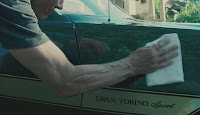 It may seem pretty obvious to anyone who's seen Gran Torino that Walt (played by Clint Eastwood) is a type of Christ (*spoiler alert*), what with his personal sacrifice and laying down his life so that his neighbors could live. But Josh Walker just pointed out to me the other day something a little more insightful.
It may seem pretty obvious to anyone who's seen Gran Torino that Walt (played by Clint Eastwood) is a type of Christ (*spoiler alert*), what with his personal sacrifice and laying down his life so that his neighbors could live. But Josh Walker just pointed out to me the other day something a little more insightful.According to Josh, not only is Walt a type of Christ, but Walt's prized 1972 Gran Torino Sport is a type of salvation. Consider that early in the film Thao tries to steal the car by his own effort. By his own work, he wants to bypass Walt and take the car for himself. But he can't. The only way for Thao to really receive the car without getting simple charity is for Walt to die. Even then Thao receives the car as a gift; not because he deserved it (indeed, he tried to steal it!), but because Walt was pleased to leave the car to him.
 Another point which Walker made me aware of was that Walt left behind a "comforter" of sorts by leaving his dog to remain friends with Thao and remind him of his presence. At the end of the film we see Thao driving off in this car, with his new comforter, Daisy the dog, in the passenger seat.
Another point which Walker made me aware of was that Walt left behind a "comforter" of sorts by leaving his dog to remain friends with Thao and remind him of his presence. At the end of the film we see Thao driving off in this car, with his new comforter, Daisy the dog, in the passenger seat.
Adam-
ReplyDeleteYou are certainly right about the Christ type of Eastwood, the central theme. Interestingly, as a pacifist, there is even more fertile ground in this film for how to beat the prevealing powers as Christ did, non-violently! (couldn't resist, given my dialogue with your peers)
And the point about salvation that you mention was also very interesting. However, even given your own logic, couldn't it be argued that it pleased Walt to give the car to Thao precisely because he "deserved" it through his obedience and acts of contrition? Not that anyone deserves acts of charity, but rather that Thao was made worthy (or proved himself worthy) of it through his actions (certainly more than Clint's own kids were).
But I feel that it might be a stretch to insist on this theme in the movie. For one thing, Thao wasn't obsessed with the car at all. He only wanted to steal it to keep his cousins off his back (though he certainly thought it a nice car). Second, even after his tutelage under Eastwood, the car is never a focus of Thao's again.
I think a more coherent argument would be (reenforcing the primary focus) that Clint is the figure of salvation for Thao. For it was only after Clint "discipled" Thao on how to be a man (fixing things, working hard, etc) that he was able to escape, or be saved from, his environment. While the Gran Turino may be a mark of the relationship between the two, it didn't save him from anything, nor provide him with a means of escape from his environment, which one would expect if it had been intended as a figure of salvation. And I think this is all the better, as theologically Christ is our Salvation !